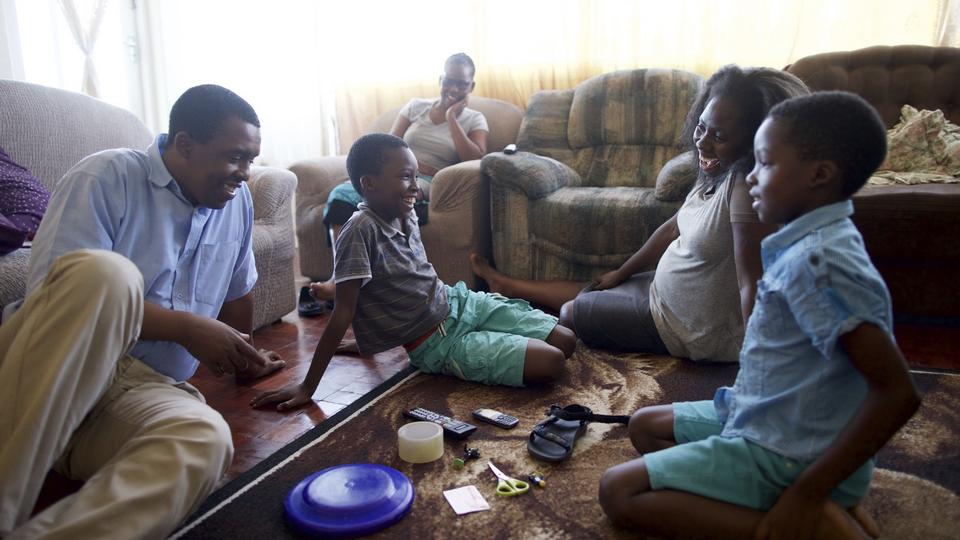
Teens Navigate Pandemic 0
A family in South Africa plays a game together. © 2020 by Intellectual Reserve, Inc. All rights reserved.This story appears here courtesy of TheChurchNews.com. It is not for use by other media.
By Jason Swensen, Church News
Almost two decades before “home church,” “quarantine” and many other pandemic-related terms became part of the Latter-day Saint vernacular, an Apostle of The Church of Jesus Christ of Latter-day Saints spoke prescient words on the power of families.
“In a world of turmoil and uncertainty, it is more important than ever to make our families the center of our lives and the top of our priorities,” said Elder L. Tom Perry of the Quorum of the Twelve Apostles at the April 2003 general conference. “Families lie at the center of our Heavenly Father’s plan” (“The Importance of the Family”).
The key role that family relations play in helping teens navigate today’s “turmoil and uncertainty” is a defining element of a research study released recently by Brigham Young University’s Wheatley Institute and the Institute for Family Studies.
Titled “Teens in Quarantine: Mental Health, Screen Time and Family Connection,” the study surveyed 1,523 U.S. teens, asking about their mental health, family time, sleep, technology use and views on the race-related protests and the police.
A common (and evidently false) narrative is that today’s teens are fragile and ill-equipped to deal with tough times. The research tells a different story.

Teens Navigate Pandemic 1
Bishop Darren L. Harline and his wife, Cherilyn, and their six children observe the Sabbath Day in their home in San Clemente, California, on March 15, 2020, after the Church suspended all meetings in the wake of the COVID-19 pandemic. Research suggests frequent family time can help teens maintain mental health during the ongoing pandemic. Photo by Alan Gibby, courtesy of Church News. All rights reserved.“We found that teens fared relatively well during quarantine,” noted the study’s authors. “Depression and loneliness were actually lower among teens in 2020 than in 2018, and unhappiness and dissatisfaction with life were only slightly higher.”
The study’s findings “were very surprising,” noted BYU professor and coauthor Sarah M. Coyne.
According to the study, “trends in teens’ time use revealed two possible reasons for the unexpectedly positive outcomes: Teens were sleeping more and spending more time with their families.”
Parents, Church leaders, social scientists and educators were, of course, concerned for the mental health of today’s teens long before the pandemic arrived. Past studies confirm that challenges such as depression, anxiety and suicide have become increasingly prevalent in recent years.
Given those teen mental health trends, “our speculation was that the pandemic would make things worse. … That was not the case,” Jean M. Twenge, one of BYU study researchers and a professor of psychology at San Diego State University, told the Deseret News.
Twenge and Coyne coauthored the study with BYU professor Jason S. Carroll and University of Virginia sociologist W. Bradford Wilcox.
Teen Resiliency During a Pandemic
The research team hoped to find answers to a question many began asking when COVID-19 began upending lives last March: How are American teenagers faring?
It's a fair question. Because of the virus, teens were no longer going to school. They suddenly couldn’t hang out with their friends. Meanwhile, sporting activities and other important social events were postponed or canceled.
American teens are experiencing the stark realities of the pandemic like anyone else. They are full-fledged participants. The BYU study indicated nearly one in three teens knew someone diagnosed with COVID-19. More than one in four said a parent had lost a job, and one in four worried about their families having enough food to eat.
Nearly two-thirds were worried about catching the virus.

Nevertheless, more than half of the teens felt they had become “a stronger and more resilient person” since the early days of the pandemic.
That’s not to suggest that teen mental health challenges are no longer widespread in the United States. “Many teens are still in need of mental-health services, and the pandemic has not changed that reality,” the study said.
But ultimately, the study revealed “a nuanced picture of teens during the pandemic quarantine. They were resilient yet worried, isolated yet connected to family, and well-rested yet concerned."
The Power of Loving Families — and a Good Night’s Sleep
Researchers identified a couple of key factors for many teens successfully meeting the mental health challenges of the pandemic.
First, teens have been sleeping more. Research confirms that teens who are sleep deprived are significantly more likely to suffer from depression.
In a similar 2018 study, only 55% of teens reported they usually slept seven or more hours a night. That figure jumped to 84% among those for whom school was in session.
Sleep, said Coyne, remains “a major protective factor in teen mental health.”
The second key factor confirms Elder Perry’s 2003 declaration championing the importance of families as surveyed teens reported spending more time with their families.

With many parents working from home — and with many other “outside the home” activities on hold for family members of all ages — the majority of teens reported increased family time. A total of 56% of them said they were spending more time talking to their parents than they had before the pandemic, and 54% said their families now ate dinner together more often. In addition, 46% reported spending more time with their siblings.
Perhaps most striking was that 68% of teens said their families had become closer during the pandemic.
Those increases in family time are linked to positive mental health outcomes among surveyed teens, the study reported. Only 15% who said their families had become closer during the pandemic were depressed, compared to 27% of those who did not believe their families had become closer.
“There is such a strong family-focus found in this study,” said Coyne.
As a parent, the BYU professor hopes the data found in the study will prompt her own family “to slow down and focus on what matters most” long after the pandemic has passed.
Another significant finding from the study is that teens from two-parent families were least likely to be depressed, both before and during the pandemic.
“This is consistent with other research on child well-being and suggests that teens in two-parent families are more likely to benefit from the additional attention and financial resources that two parents can invest in adolescents,” the report concluded.
Coyne added she has deepened regard for the resilience of young people to handle COVID-19 and whatever challenge comes their way, particularly when they enjoy the support of a loving family.
In the midst of a global pandemic, many reported feeling like a stronger and more resilient person.
Copyright 2020 Deseret News Publishing Company